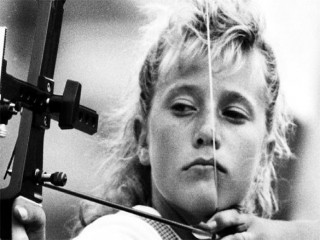
Denise Parker biography
Date of birth : 1973-12-12
Date of death : -
Birthplace : South Jordan, Utah
Nationality : American
Category : Sports
Last modified : 2010-06-23
Credited as : Athlete , Olympic archery,
0 votes so far
Nationality: American
Occupation: Archer
Source: Great Women in Sports. Visible Ink Press, 1996.
Updated: 01/01/1996
TABLE OF CONTENTS
Biographical Essay
Career
Source Citation
BIOGRAPHICAL ESSAY
Shortly after Denise Parker returned from the Seoul Olympics in 1988, the state of Utah lowered the age requirement for a bow-hunting license from the age of 16 to 14. The state didn't do that in honor of Parker, who'd been the youngest American competitor at the 1988 Olympics, placing 21st overall and sharing in a team bronze medal. Utah did it for her. And while state officials explained the details of the change to the assembled media, Parker--one of the best American archers ever--stepped out into the wild and felled a 14-point buck from 35 yards. She was only 14 at the time.
Parker has competed in two Olympics and was the winner of five medals--four gold, one silver--at the 1995 Pan American Games. She has held the U.S. national indoor archery title for seven out of the last eight years and plans to compete in her third Olympiad in 1996. As a 19-year-old, Parker finished fifth in Barcelona, where she won two matches in the Olympic round before losing by two points, on the last arrow, in the quarterfinal. The U.S. archery team finished fifth.
Born December 12, 1973, Parker was just ten years old when her stepfather, Earl, asked her if she wanted to accompany him to an archery range a few miles from home in South Jordan, Utah. At the time Denise was a confirmed tomboy who played soccer, basketball, and softball against male or female opponents. She also enjoyed working in a crew for her stepfather at motorcycle races. On that fateful afternoon, however, Denise--whose natural father had died of cancer when she was three--trailed after Earl to the archery range.
A few years later, she was flying to Japan to tape a TV show called Super Kids of the World, appearing on the cover of Parade magazine, and shooting an arrow through a Lifesaver on The Tonight Show. In a sport where age and strength are an asset, the slight teenager had become a phenomenon.
Earl Parker, who admits, "I'm kind of a stickler about doing things right," vividly remembers the early practice sessions in the family back yard. Sometimes he and Denise would shoot to see who had to do the dishes.
"Shoot six to ten arrows, then pull them out of the target and go back and shoot again," he told the Deseret News. "I imagine it got pretty boring for her. But she didn't want to stop. She wanted to shoot more."
Denise added: "For me to have fun I have to be good."
Initially, the plans were for Denise, a fourth grader during the 1984 Olympics in Los Angeles, to work up to the 1992 Olympics in Barcelona. But then came the 1987 U.S. indoor championships, where Denise, though competing in the junior division, shot at the same distance as the senior women and tallied the highest score of the tournament. "It was there," she recalled, "that I decided I wanted to be in the Olympics."
Parker subsequently placed fifth in the 1987 Olympic Festival, then burst onto the scene for good at the Pan Am Games in Indianapolis, where she won the individual gold medal and helped the U.S. squad to the team gold. All of a sudden, she was years ahead of schedule and headed for Seoul.
"I didn't expect to do so well early," Parker admitted. "I guess the practice and stuff just caught up." Said her father: "Denise was just born that way, with talent. We just helped her develop it. She's competitive and she has this special talent that you can explain something to her and she can visualize it. You can say, 'You're doing this wrong. I want you to do it this way,' and she does it."
Not that everything came naturally. Parker, who also excelled in basketball and golf, put in hours and hours of practice, did special exercises to counter tendinitis in her shoulder, and worked with a psychologist to improve her concentration. New York Times reporter William C. Rhoden pinpointed Parker's strengths in his coverage of the Indianapolis Pan Am Games. Rhoden wrote: "What makes Parker's early success especially impressive is that it comes in a sport that demands rigorous concentration and steel-nerve discipline. Archers must hold their bows steady and straight, ignoring rain, searing heat, or any other distraction that may interfere with shooting the most efficient shot."
Ed Eliason, a grizzled veteran of U.S. archery teams, observed of Parker: "If you don't have the ability to learn in this sport, you'll fall behind. Denise is a good observer. She can suffer a failure, go back to the barn, work it out and come back stronger."
The best news is that the U.S. can count on Parker for years to come. Archers outlast most other Olympic competitors, and if they can continue to be injury-free, they can reap huge amounts of experience in international competition. Once a 14-year-old wunderkind who just wanted to qualify for a bow-hunting license, Denise Parker is today a seasoned veteran of archery competitions who has literally traveled around the world to participate in events.
Asked if she ever planned to retire, Parker simply said: "Archery is a lifetime sport. That's how I think of it."
CAREER
Won individual gold medal and helped U.S. win team gold medal, Pan American Games, 1987; played for U.S. team, helping to win team bronze medal, 1988 Olympic Games, Seoul, South Korea; earned four gold medals and one silver, Pan American Games, 1995; held the U.S. national indoor archery title for seven out of the last eight years.
















